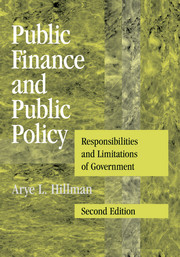Book contents
- Frontmatter
- Contents
- Preface to the Second Edition
- 1 MARKETS AND GOVERNMENTS
- 2 INSTITUTIONS AND GOVERNANCE
- 3 PUBLIC GOODS
- 4 PUBLIC FINANCE FOR PUBLIC GOODS
- 5 MARKET CORRECTIONS
- 6 VOTING
- 7 SOCIAL JUSTICE
- 8 ENTITLEMENTS
- 9 CHOICE OF TAXATION
- 10 THE NEED FOR GOVERNMENT
- TOPICS FOR DISCUSSION
- Author Index
- Subject Index
- References
1 - MARKETS AND GOVERNMENTS
- Frontmatter
- Contents
- Preface to the Second Edition
- 1 MARKETS AND GOVERNMENTS
- 2 INSTITUTIONS AND GOVERNANCE
- 3 PUBLIC GOODS
- 4 PUBLIC FINANCE FOR PUBLIC GOODS
- 5 MARKET CORRECTIONS
- 6 VOTING
- 7 SOCIAL JUSTICE
- 8 ENTITLEMENTS
- 9 CHOICE OF TAXATION
- 10 THE NEED FOR GOVERNMENT
- TOPICS FOR DISCUSSION
- Author Index
- Subject Index
- References
Summary
The most important question in the study of economics is:
When should a society forgo the economic freedom of markets and rely on the public finance and public policy of government?
This is a normative question. A normative question asks what ideally should be done or what ideally should happen. Normative questions are distinct from positive questions, the answers to which are predictions and explanations. The primary positive question that we shall ask is:
What do we predict will be the outcome when voters and taxpayers delegate responsibilities to governments through public finance and public policy?
These normative and positive questions, asked in different circumstances, are the focus of this book. We shall take care to distinguish between normative and positive questions. A clear distinction is required because we do not wish to confuse what governments ideally ought to do with what governments actually do. The two can coincide but need not.
We shall not study any one particular government – federal or central, state or provincial, or local. Descriptions of a particular government's budget and public policies become outdated when the government and the policies change. Today's government budget is not necessarily tomorrow's, nor are today's public policies necessarily the policies that will be appropriate or in place in the future. Studying the details of a particular government's budget and public policies, therefore, does not provide useful, long-lasting knowledge. Lasting knowledge requires identification of general principles that remain applicable anywhere at any time.
- Type
- Chapter
- Information
- Public Finance and Public PolicyResponsibilities and Limitations of Government, pp. 1 - 70Publisher: Cambridge University PressPrint publication year: 2009



